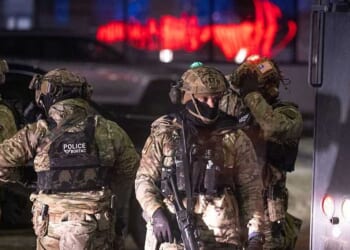With increasing threats in the space domain—jamming, satellite vulnerability, cyberattacks, and contested space operations—having resilient space systems is no longer optional.
Space is now a firmly recognized strategic domain. Indeed, it is the ultimate strategic high ground wherein the world’s great powers—and corporations—are battling for dominance. The European Defense Agency (EDA) and the European Space Agency (ESA) are cooperating more tightly on cyber-resilience for space assets in a bid to become more competitive in the strategic high ground, despite having fallen behind the Americans, Chinese, and Russians for decades.
The European Commission (EC) correctly surmises that Europe is increasingly dependent on space-based services, such as navigation, Earth-observation, and communications, and that these services are crucial for their security. Disruption of these systems and functions could render European security moot.
Europe Needs to Prepare for Space Conflict—Everyone Else Is
With the resurgence of the Russian threat to Europe, the rise of China in the East, and the return of an increasingly ambivalent America, the Europeans are attempting to indigenize as much of their society and systems as possible. Thus, there is today a serious strategic push for European autonomy in space. And being able to defend and secure these critical space systems becomes part of that autonomy goal.
There have been several initiatives undertaken to solidify Europe’s goal of becoming a self-reliant and competitive power in space. Among these initiatives are Cyber-Security Operations Center (C-SOC) which is being established by the ESAas a dedicated center for monitoring and protecting space systems, ground segments, and links (ground-space, space-space) from cyber threats.
Under the ESA’s aegis, a new optional program will integrate Earth-observation, secure communications, and positioning/navigation/timing (PNT), spectrum monitoring, and Internet of Things (IoT) to provide secure and rapid response capabilities. The ESA Ministerial Council is hearing pitches on this and it aligns with Europe’s overall security and defense needs.
What’s more, the ESA is seeking around €1 billion to develop a satellite network with high-resolution optical/radar sensors, onboard AI and processing, which would serve civilian and military-intelligence roles. It’d be dual-use in nature. And the ESA is aligning with the European Union External Action Service’s (EEAS) strategy for better use of space for security and defense, including space domain awareness, protection of critical space systems, and dual-use services.
Traditionally, ESA has been focused on civil space development—science, exploration, Earth-observation, communications, and so on. The pivot to defense means its mandate expands to include space security, resilience, and dual-use capabilities. Europe’s space industry will increasingly incorporate defense requirements, too. This may spur investment and new partnerships which could, in turn, breathe new life into Europe’s otherwise turgid, bureaucratized space industry.
The European Space Agency Will Coordinate the EU’s Space Program
Of course, the European space sector remains far too fragmented for its own good. That’s why the ESA is stepping in to act as a chief coordinator among the various stakeholders in Europe’s space sector.
Defense-oriented space capabilities tend to be cost-prohibitive. European member states will need to commit. And the ESA itself, not geared for this mission, will need to learn to handle defense-oriented procurements and governments more efficiently.
With increasing threats in the space domain including (but not limited to) jamming, satellite vulnerability, cyberattacks, and contested space operations, having resilient space systems is no longer optional for any nation or region—especially one as advanced and reliant upon space services as the Europeans are.
Just look at the Ukraine War and how space has played such a pivotal role there. At the start of the war, the Russians launched disruptive attacks against Viasat, a British-based satellite communications provider used throughout Europe. Starlink has basically become a key lifeline for Ukraine’s military.
Meanwhile, essential NATO members in Europe, such as France, have led the charge in viewing space as a real strategic domain inextricably linked to conflict on the Earth below.
Necessarily, Europe’s push for strategic autonomy in space technologies means that defense and civil convergence in this vital domain is underway.
The bottom line in all this is that ESA is poised to assume a leading role in Europe’s spaceborne defense. No, it isn’t replacing national defense agencies. It is simply acting as a central coordinating and capability provider for space assets, resilience, dual-use systems, and enabling Europe’s strategic autonomy.
While this is a welcome change in focus, it begs the question of whether merely adding another layer of bureaucracy to Europe’s already massively bureaucratized system is the best way forward for building competitiveness and adequate defenses in orbit.
Time will only tell. It is, however, important to remember that Europe’s overall security situation is a mess. Rarely do greater levels of bureaucracy change these realities.
About the Author: Brandon J. Weichert
Brandon J. Weichert is a senior national security editor at The National Interest. Recently, Weichert became the host of The National Security Hour on America Outloud News and iHeartRadio, where he discusses national security policy every Wednesday at 8pm Eastern. He is also a contributor at Popular Mechanics and has consulted regularly with various government institutions and private organizations on geopolitical issues. Weichert’s writings have appeared in multiple publications, including The Washington Times, National Review, The American Spectator, MSN, and the Asia Times. His books include Winning Space: How America Remains a Superpower, Biohacked: China’s Race to Control Life, and The Shadow War: Iran’s Quest for Supremacy. His newest book, A Disaster of Our Own Making: How the West Lost Ukraine is available for purchase wherever books are sold. He can be followed via Twitter @WeTheBrandon.
Image: Shutterstock / kittyfly.

















